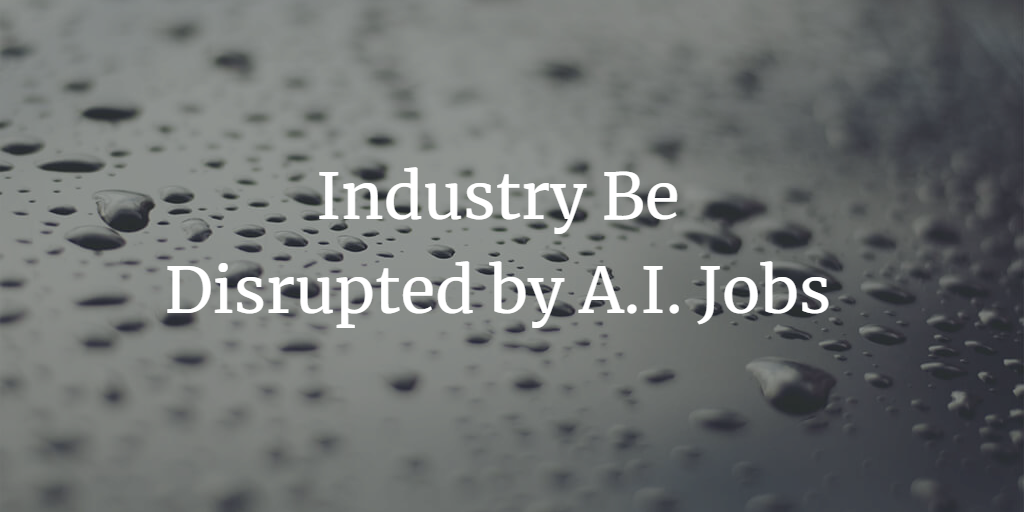The Future of Work: Could Your Industry Be Disrupted by A.I. Jobs?

Table of Contents
Introduction
Industries Most at Risk of A.I. Disruption
The Advantages of A.I. in the Workforce
How to Prepare for the A.I. Disruption
The Potential Benefits of A.I. for Job Seekers
Conclusion
1. Introduction
Artificial intelligence (A.I.) has been making significant strides in recent years, and its potential to disrupt various industries is becoming increasingly apparent. As A.I. technologies advance, it's essential to consider the impact these changes will have on the workforce and the future of work. This article explores which industries are most at risk of A.I. disruption, the advantages of A.I. in the workforce, and how individuals can prepare for the changes ahead.
2. Industries Most at Risk of A.I. Disruption
While A.I. will undoubtedly have an impact on various industries, some are more susceptible to disruption than others. Industries most at risk include:
Manufacturing: Automation and robotics have already replaced many human workers in manufacturing. As A.I. continues to advance, more specialized tasks will be automated, leading to further job displacement.
Transportation: Self-driving vehicles and drone technology are expected to revolutionize the transportation industry, potentially displacing millions of drivers and other transportation workers.
Retail: A.I. is being used to optimize inventory management, pricing strategies, and customer service, reducing the need for human employees.
Healthcare: A.I. algorithms can analyze medical data, diagnose diseases, and recommend treatment plans more efficiently than human doctors, potentially leading to significant changes in the healthcare workforce.
Finance: A.I. has the potential to replace jobs in areas such as financial analysis, trading, and banking services as automated systems become more efficient and accurate.
3. The Advantages of A.I. in the Workforce
While A.I. will undoubtedly lead to job displacement in certain sectors, it also has the potential to create numerous benefits for the workforce, including:
Increased productivity: A.I. can handle repetitive and time-consuming tasks, freeing up human workers to focus on more creative and strategic tasks.
Reduced human error: A.I. systems are less prone to making errors, leading to increased efficiency and accuracy in the workplace.
Cost savings: Implementing A.I. technology can lead to significant cost savings for businesses, as it reduces the need for human labor and streamlines processes.
New job opportunities: As A.I. technology advances, new job opportunities will emerge in areas such as A.I. development, maintenance, and regulation.
4. How to Prepare for the A.I. Disruption
To prepare for the A.I. disruption, individuals should consider the following strategies:
Develop A.I. and tech-related skills: Gain expertise in A.I., machine learning, and data analytics to stay relevant and competitive in the job market.
Focus on soft skills: Strengthen your communication, creativity, and problem-solving skills, as these are less likely to be automated and will remain valuable in the workforce.
Stay informed: Keep up-to-date with developments in A.I. and its potential impact on your industry to make informed decisions about your career path.
Consider retraining: Be open to the idea of retraining or upskilling in areas less likely to be disrupted by A.I., such as healthcare, education, or creative fields.
Embrace change: Adopt a mindset of adaptability and continuous learning to stay ahead of the curve and remain relevant in a rapidly evolving job market.
5. The Potential Benefits of A.I. for Job Seekers
Despite the potential disruptions caused by A.I., there are also several benefits for job seekers, including:
Increased demand for A.I. specialists: As more industries adopt A.I. technologies, the demand for skilled A.I. specialists will grow, offering new job opportunities.
More efficient job matching: A.I. algorithms can streamline the job search process by better matching candidates with suitable roles based on their skills and experience.
Remote work opportunities: A.I. and automation may lead to an increase in remote work opportunities, allowing individuals to work from anywhere and access a wider range of job opportunities.
6. Conclusion
The future of work will undoubtedly be shaped by the ongoing advancements in A.I. technology. While some industries may face significant disruption, the overall impact on the job market is complex and multifaceted. To prepare for the changes ahead, individuals should focus on developing A.I. and tech-related skills, honing their soft skills, and staying informed about industry developments. By embracing change and remaining adaptable, workers can navigate the evolving job market and find new opportunities in the A.I. era.


